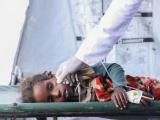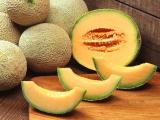Aug 9, 2002 (CIDRAP News) An outbreak of Salmonella infections linked to tomatoes affected at least 141 people, including 48 organ transplant recipients, who attended the US Transplant Games in Florida in late June, the Centers for Disease Control and Prevention (CDC) reported yesterday.
The CDC said all the patients identified so far apparently recovered. But the agency said physicians caring for transplant recipients who attended the games should be aware that such patients may have been exposed to Salmonella enterica serotype Javiana. Because immunosuppression renders transplant recipients who contract salmonellosis more susceptible to severe illness, physicians may want to consider empiric antimicrobial therapy pending a definite diagnosis, officials said.
The outbreak surfaced Jul 16, when the Minnesota Department of Health identified two S Javiana infections in patients who had attended the games, the CDC reported in the Aug 9 Morbidity and Mortality Weekly Report. The games, held Jun 25 to 29 at Disney's Wide World of Sports Complex in the Orlando area, drew about 6,000 people, including 1,500 athletes. Isolates from the two patients had indistinguishable patterns on pulsed-field gel electrophoresis (PFGE).
To find more cases, the CDC sent an e-mail survey Jul 20 to 1,100 games attendees whose addresses were available. The survey drew 369 responses (34%) by Aug 1, and 94 of these reported that at least one household member had an illness that met the case definition of fever or diarrhea with onset between Jun 25 and Jul 7. The respondents reported a total of 141 cases in 32 states.
The CDC collected detailed information on one person, selected on the basis of birth date, from each of the 369 responding households. Of this group, 82 people (22%) reported illness. Forty-eight of the 82 (59%) were transplant recipients, and 43 (52%) were receiving immunosuppressive therapy. Three people had been hospitalized.
About two thirds of the people who got sick said they had stayed at resorts in "theme park A" (presumably meaning the Disney complex), and 91% reported having eaten in restaurants in the park, the report said.
To learn what people had eaten while at the Transplant Games, the CDC sent a second survey Jul 31 to the 369 previous respondents. The second questionnaire drew 222 responses (60%) by Aug 2. Analysis showed that those who got sick were significantly more likely to have eaten food containing diced Roma tomatoes than those who stayed well (44% versus 14%; adjusted odds ratio, 4.3; 95% confidence interval, 2.1 to 9.1). "Preliminary microbiologic evaluation indicates fecal coliform contamination of the diced tomatoes," the report states.
The CDC also posted the PFGE pattern of the outbreak strain on PulseNet, the agency's molecular subtyping computer network for foodborne pathogens. This led to the identification of 18 more S Javiana infections with matching patterns in nine states, according to the report. Interviews with 16 of the 18 patients revealed that one person had participated in the Transplant Games and 12 others had visited the Disney complex in the last week in June. This finding suggests that the outbreak was probably much larger than what the survey showed, the report says.
Physicians caring for recipients of solid-organ and bone marrow transplants who attended the Florida games should be alert to their possible exposure to S Javiana and should consider obtaining cultures, the CDC said. At a CDC telebriefing yesterday, Dr. Padmini Srikantiah said complications of salmonellosis may occur in transplant recipients weeks or even months after exposure, and such patients also may be more likely to suffer relapses of infection. She said the last known date of illness onset was Jul 8, and there was no evidence yesterday that the outbreak was persisting.
"The optimal therapy for Salmonella infection in transplant recipients is not known," the MMWR report states. "However, because of the increased susceptibility to infection and the potential for complications, physicians might consider empiric antimicrobial therapy in transplant recipients with suspected salmonellosis from whom appropriate cultures have been obtained. The strain of S. Javiana responsible for this outbreak is susceptible to several commonly used antimicrobials, including trimethoprim-sulfamethoxazole, ciprofloxacin, and ceftriaxone."
The report says tomatoes are not a common vehicle for Salmonella, and there is no evidence of widespread contamination of tomatoes. However, tomatoes have been implicated in at least one previous outbreak of S Javiana infections, and sliced tomatoes and other fresh fruits and vegetables can support Salmonella growth.
S Javiana is the fifth most common Salmonella strain identified in the United States, accounting for about 3.5% of isolates, the CDC said.
CDC. Outbreak of Salmonella serotype Javiana infectionsOrlando, Florida, June 2002. MMWR 2002(Aug)51(31):683-4
http://www.cdc.gov/mmwr/preview/mmwrhtml/mm5131a2.htm
See also:
CDC telebriefing transcript
http://www.cdc.gov/media/transcripts/t020808.htm
















